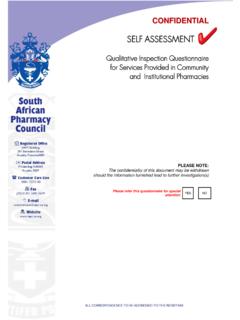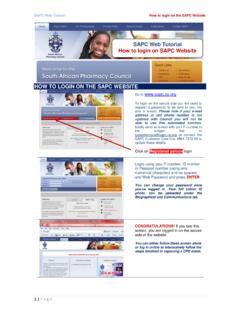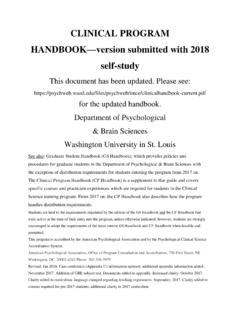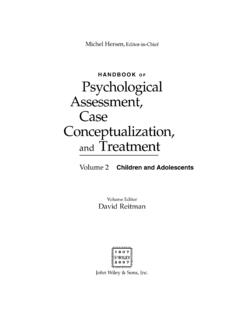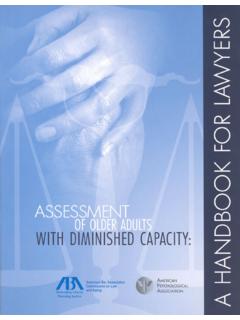Transcription of Psychological assessment - MM3 Admin
1 MIND MATTERS: April 2013 Psychological assessment What does Psychological assess-ment (PA), as referred to in our tariff codes, involve? Re-evaluating the concept may both remind us of the significance of thorough evaluation and introduce us to wider means of hypothesis testing, diagnosing, classifying and outcome measuring. PA is a process whereby a combination of techniques and multiple sources provide integrated information on an individual s behaviour, personality and capabilities. This definition (ref resources) further states that PA involves various parts; that is interviews, observations, informal assessment and/or norm-referenced (standardized) Psychological tests.
2 A combined medical examination is recommended during the process. The purpose of PA is thus to provide the necessary first step in treating a diagnosed disorder. It elevates our understanding of the problem and defines our therapeutic decisions. Deciding on the method of PA often stems from the practitioners psychotherapeutic outlook. Some may feel that informal assessment promotes rapport, others that the problem is explicated during the therapeutic process. Still others warn against the disadvantages of informal assessment , such as the possibility of overlooking important information, potential bias, the absence of a point of reference and unnecessary time consumption.
3 A sensitive approach during the initial interview, together with a balance between structure and flexibility, would seem to be the advised route to take. Psychological tests (PT) are instruments that measure latent variables (unobserved constructs) for maximum performance whereas questionnaires measure typical performance. We all recall our pre-grad lectures on relationships between variables, mapping functions, simple correlations, multiple regressions, reliability and validity factors, etc., as well as the long hours of psychometric evaluations during our internships.
4 Experimental vs observational approaches, using different statistical procedures have led to an ever increasing repertoire of psychometric instruments Psychometry originated during the 19th century from the Victorian (Darwin, Galton, Cattell) and German (Fechner & Wundt) streams, both measuring individual differences. The German stream lead to the development of experimental psychology and standardized testing. Whatever exists at all exists in some amount . Thorndike 1918 Psychometrics is that area of psychology that specializes in how to measure what we talk and think about p5 Recommended reading Psychometric Theory 3E.
5 Jum Nunnally 2010 The Contribution of Psychometric Testing in Clinical Practice By Katherine du Plessis (Jopie van Rooyen & partners SA (Pty)Ltd) Psychometric tools are designed to complement the expertise of psychologists. In clinical practice for example, they provide valuable insight into clients personalities which in turn facilitates the process of differential diagnosis. Although the knowledge of the practitioner is essential in understanding the client s unique situation, the advantage of having an additional, objective record of the client cannot be underestimated.
6 Distressed clients may not be able to accurately report their mental states due to limited verbal skills, deceptiveness, defensiveness or a lack of personal insight (Eisman et al., 2000). Psychological assessments are beneficial when used appropriately and skilfully by well-trained professionals. It is important to remember that these assessments are tools that assist in drawing inferences about individuals and groups, but should not be used in isolation. They can be a key component in the practice and science of psychology. However, when misused Psychological tests may have limited use or could even be harmful (Urbina, 2004).
7 One of the ways to avoid the misuse of Psychological tests is to ensure that the measures used are appropriate for the client s population. For example, the Minnesota Multiphasic Personality Inventory (MMPI ) and the Millon Clinical Multiaxial Inventory (MCMI ) are well-known personality measures, both of which demonstrate good reliability in the South African context. Intelligence measures such as the Wechsler scales allow practitioners to assess their client s cognitive functioning in order to make diagnostic and treatment decisions in various developmental, neurological and psychiatric contexts (Pearson, 2009).
8 Currently, a large scale validation project is being conducted to create norms for the Wechsler Adult Intelligence Scales -Fourth Edition (WAIS -IV) in South Africa. There are various instruments available for assessing and monitoring clients in clinical practice., The choice of assessment should be guided by a clear purpose that will facilitate and support the clinicians judgement, but not suspend it. Care should therefore be taken to ensure that the assessment is relevant and applicable to a specific context. References: Eisman, E. J., Dies, R. R., Finn, S. E., Eyde, L.
9 D., Kay, G. G., Kubiszyn, T. W., & Moreland, K. L. (2000). Problems and limitations in using Psychological assessment in the contemporary health care delivery system. Professional Psychology: Research and Practice, 31(2), 131 140. Pearson. (2009). Overview of advanced clinical solutions for WAIS IV and WMS IV. Pearson. Retrieved from Segal, D. L., & Coolidge, F. L. (2004). Objective assessment of personality and psychopathology: An overview. In M. J. Hilsenroth, D. L. Segal, & M. Hersen (Eds.), Comprehensive handbook of Psychological assessment . Volume 2, Personality assessment .
10 New York: John Wiley & Sons. Retrieved from {3106FE60-7A81-485A-B9C5-81EF2DF15B1C}&F ormat=50 Urbina, S. (2004). Introduction to Psychological tests and their uses. In Essentials of Psychological testing (Vol. Volume 4 of Essentials of Behavioral Science, pp. 1 33). Hoboken, : John Wiley & Sons. Retrieved from Please note new date for next GM in Pretoria: Wednesday 5 June 2013. Topics include PMB s and Suicide Management (CPD points available). Please forward any comments or requests to Shane Pienaar Gustaf Pretorius Editor Sub-Editor CLINICAL PSYCHOLOGY FORUM Yet one wonders if clinical psychologists employ these instruments, and if so, to what measure.
